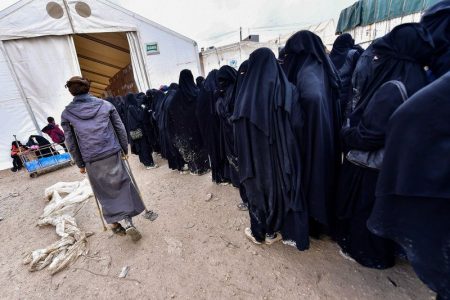
Misery grows at Syrian camp holding ISIS family members
In northeast Syria, an overcrowded detention camp is home to more than 73,000 people who lived in the former ISIS caliphate. Almost three-quarters of the al-Hol camp residents are children — born to Syrian, Iraqi and other foreign parents who flocked to the ISIS caliphate over the five years it ruled territory here.
In recent visits to the camp, NPR was told of babies dying from malnutrition and disease, and found women collapsed by the side of the road.
A woman moaning in pain sits on the pavement, too weak to pull herself up to a metal bench after undergoing kidney surgery at a hospital outside the camp earlier that day. There’s no transportation to take her to her tent.
Nearby, an Iraqi mother holds a baby with a skull fracture from a fall. “I wanted a scan to make sure she is all right, but they won’t send me for one,” she says.
Along a road in the camp, a woman dressed in an enveloping black niqab has collapsed. A group of women flags down a passing van, then gathers around and lifts her into the back seat.
By mid-April, 200 children had either died on their way to the camp from the last ISIS stronghold of Baghouz, or shortly after arriving. Many died of malnutrition or hypothermia, and with shortages of medical facilities and infant formula for mothers who can’t nurse, children’s health in the camp remains precarious.
Officials say some international aid agencies are reluctant to provide assistance to people with a perceived ISIS affiliation.
Source: NPR





